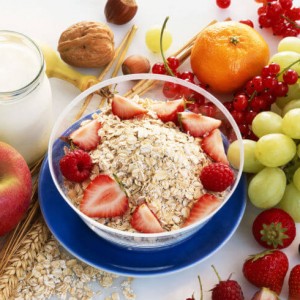
A balanced diet is necessary to maintain health and increase resistance to disease. It is essential, therefore, that the housewife give some time and thought to the foods she selects.
USES OF FOOD
To provide the heat and energy necessary to maintain life. The heat and energy-producing constituents found in food are carbohydrates, i.e., starches and sugars, fats and proteins.
To replace and/or repair worn-out muscles and tissue. This need is met primarily by proteins and minerals, although some other constituents play a part.
To provide material for growth. During the period of growth a child's diet should consist of approximately 25 percent protein, 25 percent fat, and 50 percent carbohydrates.
To provide substances which control and regulate the various processes of the body. This is usually the special function of water, vitamins, and minerals, which are necessary to help control many intricate body processes.
 These are the groups of essential foods:
These are the groups of essential foods:
These are of animal and vegetable origin.
Animal proteins are sufficient to promote growth even if no other protein is included. Vegetable proteins, although necessary, cannot by themselves promote normal growth.
First-class protein is found in milk, lean meat, fish, eggs, cheese, poultry, rabbit, soya beans, peanuts.
Second-class protein is supplied by cereals, dried peas, beans, and lentils.
FATS AND OILS
These supply energy and warmth; they are of animal and vegetable origin. Best sources are butter, cream, and creamy whole milk, fat of meat, bacon fat, lard, margarine, suet, nuts, fish and vegetable oils, pork, egg-yolk.
CARBOHYDRATES (Sugar and Starches)
These also supply heat and energy, but should not be over-supplied at the expense of fats. Excessive consumption of carbohydrates or fats tends to increase body weight.
Carbohydrates are found in bread, cereals and cereal products, starchy vegetables, dried vegetables, jams, honey, syrups, dried fruits, biscuits, cakes, candies, etc.
VITAMINS
 These vital chemical substances are required only in minute quantities, but are necessary for the body to use efficiently all other food nutrients. No deficiency will occur if a varied diet is provided and the vitamin content is net destroyed by careless cooking.
These vital chemical substances are required only in minute quantities, but are necessary for the body to use efficiently all other food nutrients. No deficiency will occur if a varied diet is provided and the vitamin content is net destroyed by careless cooking.
Essential vitamins are found in dairy products (butter, cheese, cream, eggs), fresh fruits and vegetables, whole-grain cereals, meat and fish, especially fish oils, yeast and yeast products.
Credit: ABC
MINERALS
Most important minerals are calcium, iron, phosphorus, and iodine; ether less important minerals are found in many foods in such minute amounts that they are classed as "trace elements."
To ensure an adequate supply of calcium, iron, phosphorus, and iodine the diet must include plenty of milk, cheese, dark green vegetables, eggs, and carrots.
WATER
A certain amount of thc water needed to repair body functions is supplied by food; the remainder must be taken in the form of drinks.
AMOUNTS REQUIRED
 A balanced diet is made up of a mixture of foods, because no one food, except milk, contains all the necessary food substances in the right proportion to maintain life and normal health.
A balanced diet is made up of a mixture of foods, because no one food, except milk, contains all the necessary food substances in the right proportion to maintain life and normal health.
Quantity and type of food needed depend on age, sex, occupation, and general health of the individual. Amount also varies according to degree of muscular work done and season of year.
Women require less food than men. Growing children, in proportion to their body weight, all need more food than adults to allow for rapid growth and to replenish energy used up by constant activity.
In old age less food is necessary because of diminished activity and because there is no longer need for growth, only repair; amount required is less than for a younger adult of the same size; over-eating should be avoided.
Over-eating at any age results in ill health as often as under-eating, although under-feeding has a more serious effect on children than on adults. Those who are under-nourished have less resistance to infection.
SCHOOL LUNCHES
It consists of wholemeal bread spread with butter and filled with cheese or salad vegetables, meat or egg; ½ pint milk ard 1 apple.
Write your information about Baby Care for Baby Care Blog?
Sources:
http://www.health.harvard.edu/healthbeat/are-you-getting-essential-nutrients-from-your-diet
https://health.gov/dietaryguidelines/dga95/variety.htm
http://baby.stayhealthyblog.com/
https://www.eatforhealth.gov.au/food-essentials/five-food-groups